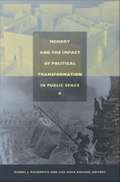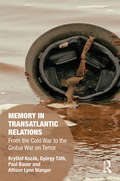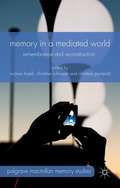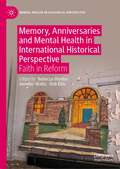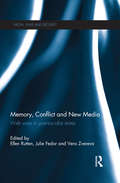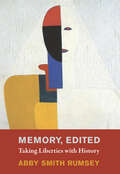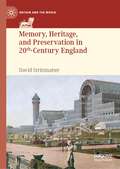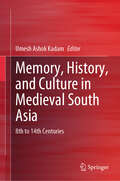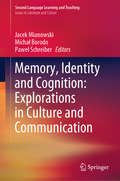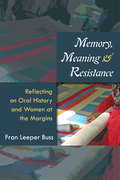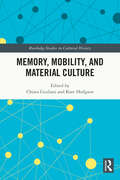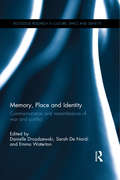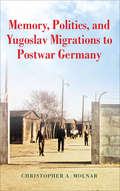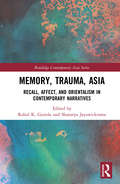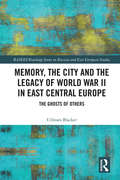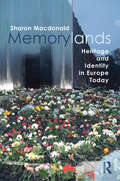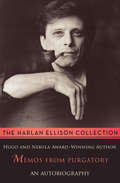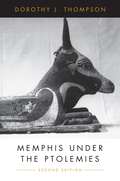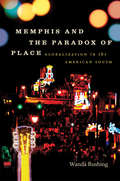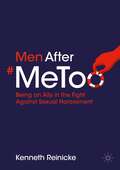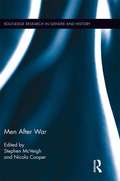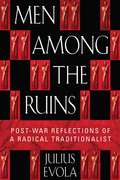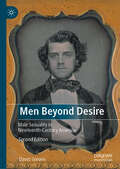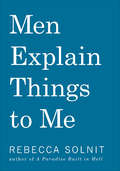- Table View
- List View
Memory and the Impact of Political Transformation in Public Space
by Daniel J. Walkowitz Lisa Maya KnauerMemory and the Impact of Political Transformation in Public Space explores the effects of major upheavals--wars, decolonization, and other social and economic changes--on the ways in which public histories are presented around the world. Examining issues related to public memory in twelve countries, the histories collected here cut across political, cultural, and geographic divisions. At the same time, by revealing recurring themes and concerns, they show how basic issues of history and memory transcend specific sites and moments in time. A number of the essays look at contests over public memory following two major political transformations: the wave of liberation from colonial rule in much of Africa, Asia, and Central and South America during the second half of the twentieth century and the reorganization of Eastern Europe and the former Soviet bloc beginning in the late 1980s. This collection expands the scope of what is considered public history by pointing to silences and absences that are as telling as museums and memorials. Contributors remind us that for every monument that is erected, others--including one celebrating Sri Lanka's independence and another honoring the Unknown Russian Soldier of World War II--remain on the drawing board. While some sites seem woefully underserved by a lack of public memorials--as do post-Pinochet Chile and post-civil war El Salvador--others run the risk of diluting meaning through overexposure, as may be happening with Israel's Masada. Essayists examine public history as it is conveyed not only in marble and stone but also through cityscapes and performances such as popular songs and parades. Contributors James Carter John Czaplicka Kanishka Goonewardena Lisa Maya Knauer Anna Krylova Teresa Meade Bill Nasson Mary Nolan Cynthia Paces Andrew Ross Daniel Seltz T. M. Scruggs Irina Carlota Silber Daniel J. Walkowitz Yael Zerubavel
Memory in Transatlantic Relations: From the Cold War to the Global War on Terror (Memory Studies: Global Constellations)
by Paul Bauer Allison Wanger Kryštof Kozák György TóthThis volume focuses on the uses of collective memory in transatlantic relations between the United States, and Western and Central European nations in the period from the Cold War to the present day. Sitting at the intersection of international relations, history, memory studies and various "area" studies, Memory in Transatlantic Relations examines the role of memory in an international context, including the ways in which policy and decision makers utilize memory; the relationship between trauma, memory and international politics; the multiplicity of actors who shape memory; and the role of memory in the conflicts in post-Cold War Europe. Thematically organized and presenting studies centered on the U.S., Hungary, France, the Czech Republic and Slovakia, the authors explore the built environment (memorials) and performances of memory (commemorations), shedding light on the ways in which memories are mobilized to frame relations between the U.S. and nations in Western and Central Europe. As such, it will appeal to scholars across the social sciences and historians with interests in memory studies, foreign policy and international relations.
Memory in a Mediated World: Remembrance and Reconstruction (Palgrave Macmillan Memory Studies)
by Andrea Hajek Christian Pentzold Christine LohmeierConsidering both retrospective memories and the prospective employment of memories, Memory in a Mediated World examines troubled times that demand resolution, recovery and restoration. Its contributions provide empirically grounded analyses of how media are employed by individuals and social groups to connect the past, the present and the future.
Memory, Anniversaries and Mental Health in International Historical Perspective: Faith in Reform (Mental Health in Historical Perspective)
by Rob Ellis Jennifer Wallis Rebecca WynterThis book is the first to explore memory, misremembering, forgetting, and anniversaries in the history of psychiatry and mental health. It challenges simplistic representations of the callous nature of mental health care in the past, while at the same time eschewing a celebratory and uncritical marking of anniversaries and individuals. Asking critical questions of the early Whiggish histories of mental health care, the book problematizes the idea of a shared professional and institutional history, and the abiding faith placed in the reform of medicine, administration, and even patients. It contends that much post-1800 legislation drafted to ensure reform, acted to preserve beliefs about the ‘bad old days’ and a ‘brighter future’ in the state memories of imperial powers, which in turn exported these notions around the world. Conversely, the collection demonstrates the variety of remembering and forgetting, building on recent interest in the ideological and cultural linkages between past and present in international psychiatric practice. In this way, it seeks to trace the pathways of memory, exploring the direction of travel, and the perpetuation, remodeling, and uprooting of recollection.Chapter “The New Socialist Citizen and ‘Forgetting’ Authoritarianism: Psychiatry, Psychoanalysis, and Revolution in Socialist Yugoslavia” is available open access under a Creative Commons Attribution 4.0 International License via link.springer. com.
Memory, Conflict and New Media: Web Wars in Post-Socialist States (Media, War and Security)
by Julie Fedor Ellen Rutten Vera ZverevaThis book examines the online memory wars in post-Soviet states – where political conflicts take the shape of heated debates about the recent past, and especially World War II and Soviet socialism. To this day, former socialist states face the challenge of constructing national identities, producing national memories, and relating to the Soviet legacy. Their pasts are principally intertwined: changing readings of history in one country generate fierce reactions in others. In this transnational memory war, digital media form a pivotal discursive space – one that provides speakers with radically new commemorative tools. Uniting contributions by leading scholars in the field, Memory, Conflict and New Media is the first book-length publication to analyse how new media serve as a site of political and national identity building in post-socialist states. The book also examines how the construction of online identity is irreversibly affected by thinking about the past in this geopolitical domain. By highlighting post-socialist memory’s digital mediations and digital memory’s transcultural scope, the volume succeeds in a twofold aim: to deepen and refine both (post-socialist) memory theory and digital-memory studies. This book will be of much interest to students of media studies, post-Soviet studies, Eastern European Politics, memory studies and International Relations in general.
Memory, Edited: Taking Liberties with History
by Abby Smith RumseyAn exploration of historical memory and networks of meaning in the context of today&’s crises of extremism and polarization.As authoritarianism continues to rise around the world, the stories we tell ourselves about what has happened and what is happening become ever more relevant. In Memory, Edited, Abby Smith Rumsey examines collective memory, how it binds us, and how it can be used by bad actors to manipulate us. Bringing forward the voices of a rich cast of Eastern European artists from the past two hundred years—from Fyodor Dostoevsky to Gerhard Richter—Rumsey shows how their work and lives illustrate the devastation wrought by regimes dependent on entrenched lies to survive. This hijacking of the narrative polarizes communities even as it commandeers our future.Through an interdisciplinary lens that includes the best thinking from history, the arts, cognitive science, psychology, and political philosophy, Rumsey lays bare our narratives, showing how they are constructed and how they have changed over time. Ever-aware of resisting the false promise of utopia, Rumsey argues that only by confronting the past and reckoning with the crimes that were committed can we ever hope to heal and gain self-knowledge. Memory, Edited is an indispensable text for anyone who cares about democracy, equality, and freedom in our current age of crisis.
Memory, Heritage, and Preservation in 20th-Century England (Britain and the World)
by David StrittmatterThis book explores commemoration practices and preservation efforts in modern Britain, focusing on the years from the end of the First World War until the mid-1960s. The changes wrought by war led Britain to reconsider major historical episodes that made up its national narrative. Part of this process was a reassessment of heritage sites, because such places carry socio-political meaning as do the memorials that mark them. This book engages the four-way intersection of commemoration, preservation, tourism, and urban planning at some of the most notable historic locations in England. The various actors in this process—from the national government and regional councils to private organizations and interested individuals—did nothing less than engineer British national memory. The author presents case studies of six famous British places, namely battlefields (Hastings and Bosworth), political sites (Runnymede and Peterloo), and world’s fairgrounds (the Crystal Palace and Great White City). In all three genres of heritage sites, one location developed through commemorations and tourism, while the other ‘anti-sites’ simultaneously faltered as they were neither memorialized nor visited by the masses. Ultimately, the book concludes that the modern social and political environment resulted in the revival, creation, or erasure of heritage sites in the service of promoting British national identity. A valuable read for British historians as well as scholars of memory, public history, and cultural studies, the book argues that heritage emerged as a discursive arena in which British identity was renegotiated through times of transitions, both into a democratic age and an era of geopolitical decline.
Memory, History, and Culture in Medieval South Asia: 8th to 14th Centuries
by Umesh Ashok KadamThis book explores the dynamic interplay between memory and history during the crucial period from the 8th to the 14th century in medieval India. It takes up an interdisciplinary approach and includes contributions from seasoned scholars and emerging researchers across memory studies, folklore, ethnography, linguistics, literary studies, intellectual history, sociology, epigraphy, and archeology. Thematically organized, the book examines how the past was transmitted through collective memory, including inscriptions, monuments, royal narratives, folklore, language, travelogues, memoirs, religious practices, and ethnography of diverse communities. Departing from conventional historiographical narratives, it analyzes the medieval politico-cultural landscape of the region through a geo-cultural lens, emphasizing historical interactions and cultural preservation in collective memory. An invaluable resource for academics and professionals in history and related disciplines, this book also appeals to general readers interested in Indian history and culture. It is a rich and informative reference resource for students, practitioners, and enthusiasts in social sciences.
Memory, Identity and Cognition: Explorations in Culture and Communication (Second Language Learning and Teaching)
by Michał Borodo Jacek Mianowski Paweł SchreiberThe book analyses a variety of topics and current issues in linguistics and literary studies, focusing especially on such aspects as memory, identity and cognition. Firstly, it discusses the notion of memory and the idea of reimagining, as well as coming to terms with the past. Secondly, it studies the relationship between perception, cognition and language use. It then investigates a variety of practices of language users, language learners and translators, such as the use of borrowings from hip-hop and slang. The book is intended for researchers in the fields of linguistics and literary studies, lecturers teaching undergraduate and master’s students on courses in language and literature.
Memory, Meaning, and Resistance: Reflecting on Oral History and Women at the Margins
by Fran Leeper BussFran Leeper Buss, a former welfare recipient who earned a PhD in history and became a pioneer in the field of oral history, has for forty years dedicated herself to the goal of collecting the stories of marginal and working-class U.S. women. Memory, Meaning, and Resistance is based on over 100 oral histories gathered from women from a variety of racial, ethnic, and geographical backgrounds, including a traditional Mexican American midwife, a Latina poet and organizer for the United Farm Workers, and an African American union and freedom movement organizer. Buss now analyzes this body of work, identifying common themes in women’s lives and resistance that unite the oral histories she has gathered. From the beginning, her work has shed light on the inseparable, compounding effects of gender, race, ethnicity, and class on women’s lives—what is now commonly called intersectionality. Memory, Meaning, and Resistance is structured thematically, with each chapter analyzing a concept that runs through the oral histories, e.g., agency, activism, religion. The result is a testament to women’s individual and collective strength, and an invaluable guide for students and researchers, on how to effectively and sensitively conduct oral histories that observe, record, recount, and analyze women’s life stories.
Memory, Mobility, and Material Culture (Routledge Studies in Cultural History)
by Kate Hodgson Chiara GiulianiWith a focus on the object and where it is situated, in time (memory) and space (mobility), Memory, Mobility, and Material Culture embodies a multidisciplinary and cross-disciplinary approach. The chapters track the movement of the objects and their owner(s), within and between continents, countries, cities, and families. Objects have always been considered with an eye to their worth – economic, aesthetic, and/or functional. If that worth is diminished, their meaning and value disappear, they are just things. Yet things can still fulfil functions in our daily lives; they hold symbolic potential, from personal memory triggers, to focal points of public ritual and religion; from collectors’ obsession, to symbols of loss, displacement, and violence. By bringing into dialogue the work of specialists in ethnology, art history, architecture, and design; literature, languages, cultures, and heritage studies, this volume considers how displaced memory – the memory of refugees, migrants, and their descendants; of those who have moved from the countryside to the city; of those who have faced personal upheaval and profound social change; those who have been forced into exile or experienced major personal or collective loss – can become embodied in material culture. This book is important reading to those interested in cultural and social history and cultural studies.
Memory, Mobility, and Material Culture (Routledge Studies in Cultural History)
by Kate Hodgson Chiara GiulianiWith a focus on the object and where it is situated, in time (memory) and space (mobility), Memory, Mobility, and Material Culture embodies a multidisciplinary and cross-disciplinary approach.The chapters track the movement of the objects and their owner(s), within and between continents, countries, cities, and families. Objects have always been considered with an eye to their worth – economic, aesthetic, and/or functional. If that worth is diminished, their meaning and value disappear, they are just things. Yet things can still fulfil functions in our daily lives; they hold symbolic potential, from personal memory triggers, to focal points of public ritual and religion; from collectors’ obsession, to symbols of loss, displacement, and violence. By bringing into dialogue the work of specialists in ethnology, art history, architecture, and design; literature, languages, cultures, and heritage studies, this volume considers how displaced memory – the memory of refugees, migrants, and their descendants; of those who have moved from the countryside to the city; of those who have faced personal upheaval and profound social change; those who have been forced into exile or experienced major personal or collective loss – can become embodied in material culture. This book is important reading to those interested in cultural and social history and cultural studies.
Memory, Place and Identity: Commemoration and remembrance of war and conflict (Routledge Research in Culture, Space and Identity)
by Emma Waterton Danielle Drozdzewski Sarah De NardiThis book bridges theoretical gaps that exist between the meta-concepts of memory, place and identity by positioning its lens on the emplaced practices of commemoration and the remembrance of war and conflict. This book examines how diverse publics relate to their wartime histories through engagements with everyday collective memories, in differing places. Specifically addressing questions of place-making, displacement and identity, contributions shed new light on the processes of commemoration of war in everyday urban façades and within generations of families and national communities. Contributions seek to clarify how we connect with memories and places of war and conflict. The spatial and narrative manifestations of attempts to contextualise wartime memories of loss, trauma, conflict, victory and suffering are refracted through the roles played by emotion and identity construction in the shaping of post-war remembrances. This book offers a multidisciplinary perspective, with insights from history, memory studies, social psychology, cultural and urban geography, to contextualise memories of war and their ‘use’ by national governments, perpetrators, victims and in family histories.
Memory, Politics, and Yugoslav Migrations to Postwar Germany
by Christopher A. MolnarThis historical study &“persuasively links the reception of Yugoslav migrants to West Germany&’s shifting relationship to the Nazi past . . . essential reading&” (Tara Zahra, author of The Great Departure). During Europe&’s 2015 refugee crisis, more than a hundred thousand asylum seekers from the western Balkans sought refuge in Germany. This was nothing new, however. Immigrants from the Balkans have streamed into West Germany in massive numbers since the end of the Second World War. In fact, Yugoslavs became the country&’s second largest immigrant group. Yet their impact has received little critical attention until now. Memory, Politics, and Yugoslav Migrations to Postwar Germany tells the story of how Germans received the many thousands of Yugoslavs who migrated to Germany as political emigres, labor migrants, asylum seekers, and war refugees from 1945 to the mid-1990s. With a particular focus on German policies and attitudes toward immigrants, Christopher Molnar argues that considerations of race played only a marginal role in German attitudes and policies towards Yugoslavs. Rather, the history of Yugoslavs in postwar Germany was most profoundly shaped by the memory of World War II and the shifting Cold War context. Molnar shows how immigration was a central aspect of how Germany negotiated the meaning and legacy of the war.
Memory, Trauma, Asia: Recall, Affect, and Orientalism in Contemporary Narratives (Routledge Contemporary Asia Series)
by Rahul K. Gairola and Sharanya JayawickramaContemporary Asia is a diverse and sweeping region throughout which traumatic legacies of colonialism persist as military regimes and dictatorships have produced untold human suffering. Countless losses of life have been caused by disease, revolution, civil war, and genocide from the distant past into the 21st century. A global pandemic, natural catastrophes, closed borders, and acute xenophobia render existing social and political tensions even more volatile today. As such, two critical imperatives of Memory, Trauma, Asia are to re-think established insights of memory and trauma theory and to enrich trauma studies with diverse Asian texts for critically analyzing literary and cultural representations of Asia and its global diasporas. This volume broadens the scope of memory and trauma studies by prompting and dialogically meditating on the following questions: Is memory always a reliable register of the past? Is trauma a concept that translates across cultures? Can pain and affect have global applicability and utility for literary and cultural analysis? Do the approaches and perspectives generated by literary and cultural texts hold purchase for social, political, and historical interventions in the 21st century? How are Asians subject to orientalist lenses that warrant foreclosure of empathy and humanity? How do inter-ethnic racism, inter-Asian classism, queerphobia, sexism, misogynoir, and systemic xenophobia continue to impact Asian people and culture? By critically meditating on whether existing concepts of memory and trauma accurately address the histories, present states, and futures of the non-Occidental world, this volume unites perspectives on both dominant and marginalized sites of the broader Asian continent. Contributors explore the complex and surprising intersections of literature, history, ethics, affect, and social justice across the region through its wide-ranging but comparative focus on geo-political sites across East, South, and Southeast Asia, and on Asian diasporas in Australia and the USA. This volume is thus the first of its kind to argue for a comparative methodology in memory and trauma studies that centers Asia rather than pushing it to the periphery of the Occident. It will appeal to scholars, students, teachers, and readers interested in memory and trauma studies, comparative Asian studies, diaspora and postcolonial studies, global studies, and women, gender, and sexuality studies in the 21st century.
Memory, the City and the Legacy of World War II in East Central Europe: The Ghosts of Others (BASEES/Routledge Series on Russian and East European Studies)
by Uilleam BlackerAfter the Second World War, millions of people across Eastern Europe, displaced as a result of wartime destruction, deportations and redrawing of state boundaries, found themselves living in cities that were filled with the traces of the foreign cultures of the former inhabitants. In the immediate post-war period these traces were not acknowledged, the new inhabitants going along with official policies of oblivion, the national narratives of new post-war regimes, and the memorializing of the victors. In time, however, and increasingly over recent decades, the former "other pasts" have been embraced and taken on board as part of local cultural memory. This book explores this interesting and increasingly important phenomenon. It examines official ideologies, popular memory, literature, film, memorialization and tourism to show how other pasts are being incorporated into local cultural memory. It relates these developments to cultural theory and argues that the relationship between urban space, cultural memory and identity in Eastern Europe is increasingly becoming a question not only of cultural politics, but also of consumption and choice, alongside a tendency towards the cosmopolitanization of memory.
Memorylands: Heritage and Identity in Europe Today
by Sharon MacdonaldMemorylands is an original and fascinating investigation of the nature of heritage, memory and understandings of the past in Europe today. It looks at how Europe has become a ’memoryland’ – littered with material reminders of the past, such as museums, heritage sites and memorials; and at how this ‘memory phenomenon’ is related to the changing nature of identities – especially European, national and cosmopolitan. In doing so, it provides new insights into how memory and the past are being performed and reconfigured in Europe – and with what effects. Drawing especially, though not exclusively, on cases, concepts and arguments from social and cultural anthropology, Memorylands argues for a deeper and more nuanced understanding of the cultural assumptions involved in relating to the past. It theorizes the various ways in which ‘materializations’ of identity work and relates these to different forms of identification within Europe. The book also addresses questions of methodology, including discussion of historical, ethnographic, interdisciplinary and innovative methods. Through a wide-range of case-studies from across Europe, Sharon Macdonald argues that Europe is home to a much greater range of ways of making the past present than is usually realized – and a greater range of forms of ‘historical consciousness’. At the same time, however, she seeks to highlight what she calls ‘the European memory complex’ – a repertoire of prevalent patterns in forms of recollection and ‘past presencing’. The examples in Memorylands are drawn from both the margins and metropolitan centres, from the relatively small-scale and local, the national and the avant-garde. The book looks at pasts that are potentially identity-disrupting – or ‘difficult’ – as well as those that affirm identities or offer possibilities for transcending national identities or articulating more cosmopolitan futures. Topics covered include authenticity, temporalities, embodiment, commodification, nostalgia and Ostalgie, the musealization of everyday and folk-life, Holocaust commemoration and tourism, narratives of war, the heritage of Islam, transnationalism, and the future of the past. Memorylands is engagingly written and accessible to general readers as well as offering a new synthesis for advanced researchers in memory and heritage studies. It is essential reading for those interested in identities, memory, material culture, Europe, tourism and heritage.
Memos from Purgatory: An Autobiography
by Harlan EllisonHemingway said, "A man should never write what he doesn't know." In the mid-fifties, Harlan Ellison--kicked out of college and hungry to write--went to New York to start his career. It was a time of street gangs, rumbles, kids with switchblades, and zip guns made from car radio antennas. Ellison was barely out of his teens himself, but he took a phony name, moved into Brooklyn's dangerous Red Hook section, and managed to con his way into a "bopping club." What he experienced (and the time he spent in jail as a result) was the basis for the violent story that Alfred Hitchcock filmed as the first of his hour-long TV dramas. This autobiography is a book whose message you will not be able to ignore or forget.
Memphis Under the Ptolemies: Second Edition
by Dorothy J. ThompsonDrawing on archaeological findings and an unusual combination of Greek and Egyptian evidence, Dorothy Thompson examines the economic life and multicultural society of the ancient Egyptian city of Memphis in the era between Alexander and Augustus. Now thoroughly revised and updated, this masterful account is essential reading for anyone interested in ancient Egypt or the Hellenistic world.The relationship of the native population with the Greek-speaking immigrants is illustrated in Thompson's analysis of the position of Memphite priests within the Ptolemaic state. Egyptians continued to control mummification and the cult of the dead; the undertakers of the Memphite necropolis were barely touched by things Greek. The cult of the living Apis bull also remained primarily Egyptian; yet on death the bull, deified as Osorapis, became Sarapis for the Greeks. Within this god's sacred enclosure, the Sarapieion, is found a strange amalgam of Greek and Egyptian cultures.
Memphis and the Paradox of Place: Globalization in the American South
by Wanda RushingCelebrated as the home of the blues and the birthplace of rock and roll, Memphis, Tennessee, is where Elvis Presley, B. B. King, Johnny Cash, and other musical legends got their starts. It is also a place of conflict and tragedy--the site of Martin Luther King Jr. 's 1968 assassination--and a city typically marginalized by scholars and underestimated by its own residents. Using this iconic southern city as a case study, Wanda Rushing explores the significance of place in a globalizing age. Challenging the view that globalization renders place generic or insignificant, Rushing argues that cultural and economic distinctiveness persists in part because of global processes, not in spite of them. Rushing weaves her analysis into stories about the history and global impact of blues music, the social and racial complexities of Cotton Carnival, and the global rise of FedEx, headquartered in Memphis. She portrays Memphis as a site of cultural creativity and global industry--a city whose traditions, complex past, and specific character have had an influence on culture worldwide.
Men After #MeToo: Being an Ally in the Fight Against Sexual Harassment
by Kenneth ReinickeGrounded in an explicit focus on men's roles and responsibilities in the fight against sexual harassment, this book creates a deeper understanding of why sexual harassment against women occurs and how we, as a society, can better respond to and prevent it. Integrating theoretical analyses with empirical data from interviews with 25 Danish men, the author argues that if we want to eradicate the social and cultural tolerance of sexual harassment and the victim blaming of women, then we need a paradigm-shifting perspective. This book investigates the framing of the debates on sexual harassment, just as it looks deeper into the socialization processes of men, and raises the question of why so many men feel entitled to sexually harass women. This book also explores what part men can play in combating sexual harassment, emphasizing that it is important not only to see men as perpetrators, but also as empowered bystanders. It argues that the #MeToo movement constitutes a potential instructive moment, presenting men with an opportunity for change.
Men After War: Men After War (Routledge Research in Gender and History #16)
by Nicola Cooper Stephen McVeighThis book is an innovative collection of original research which analyzes the many varieties of post-conflict masculinity. Exploring topics such as physical disability and psychological trauma, and masculinity and sexuality in relation to the "feminizing" contexts of wounding and desertion, this volume draws together leading academics in the fields of gender, history, literature, and disability studies, in an inter- and multi-disciplinary exploration of the conditions and circumstances that men face in the aftermath of war.
Men Among the Ruins: Post-War Reflections of a Radical Traditionalist
by Julius EvolaJulius Evola's masterful overview of the political and social manifestations of our time, the "age of decline" known to the Hindus as the Kali Yuga.• Reveals the occult war that underlies the crises that have become a prevailing feature of modern life.• Includes H. T. Hansen's definitive essay on Evola's political life and theory. Men Among the Ruins is Evola's frontal assault on the predominant materialism of our time and the mirage of progress. For Evola and other proponents of Traditionalism, we are now living in an age of increasing strife and chaos: the Kali Yuga of the Hindus or the Germanic Ragnarok. In such a time, social decadence is so widespread that it appears as a natural component of all political institutions. Evola argues that the crises that dominate the daily lives of our societies are part of a secret occult war to remove the support of spiritual and traditional values in order to turn man into a passive instrument of the powerful. Evola is often regarded as the godfather of contemporary Italian fascism and right-wing radical politics, but attentive examination of the historical record--as provided by H. T. Hanson's definitive introduction--reveals Evola to be a much more complex figure. Though he held extreme right-wing views, he was a fearless critic of the Fascist regime and preferred a caste system based on spirituality and intellect to the biological racism championed by the Nazis. Ultimately, he viewed the forces of history as comprised by two factions: "history's demolition squad" enslaved by blind faith in the future and those individuals whose watchword is Tradition. These latter stand in this world of ruins at a higher level and are capable of letting go of what needs to be abandoned in order that what is truly essential not be compromised.
Men Beyond Desire: Male Sexuality in Nineteenth-Century America
by David GrevenThis book explores the construction of male sexuality in nineteenth-century American literature and overturns longstanding views. Far from desiring heterosexual sex and wishing to bond with other men through fraternity, the male protagonists of classic American literature mainly want to be left alone. Greven makes the claim that American men, eschewing both marriage and male friendship, strive to remain emotionally and sexually inviolate. Examining the work of traditional authors - Hawthorne, Poe, Melville, Cooper, Irving, Stowe - Greven discovers consistently resistant portrayals of male characters who defend their individuality through a lockdown on sexuality. Objects of desire from both women and other men, the inviolate males discussed in this study disrupt established gendered and sexual categories, inspiring fresh analysis of the era and its literary depiction of American manhood. This second edition of Men Beyond Desire (2005) expands the analysis of male sexuality to include discussions of developments in the field of masculinity studies. It includes a new introduction that introduces the complementary figure of the “victim-monster” and revisits the work of Leslie Fiedler, and a new chapter that focuses on Melville's tale "Bartleby the Scrivener" (1856). Chapter 4 expands the analysis of the intersections among free love, health reform, and male sexuality in The Blithedale Romance (1852), and chapter 9 expands the discussion of Billy Budd, Sailor to address questions of race and the role of the Handsome Sailor.
Men Explain Things to Me
by Rebecca SolnitThe National Book Critics Circle Award–winning author delivers a collection of essays that serve as the perfect &“antidote to mansplaining&” (The Stranger). In her comic, scathing essay &“Men Explain Things to Me,&” Rebecca Solnit took on what often goes wrong in conversations between men and women. She wrote about men who wrongly assume they know things and wrongly assume women don&’t, about why this arises, and how this aspect of the gender wars works, airing some of her own hilariously awful encounters. She ends on a serious note— because the ultimate problem is the silencing of women who have something to say, including those saying things like, &“He&’s trying to kill me!&” This book features that now-classic essay with six perfect complements, including an examination of the great feminist writer Virginia Woolf&’s embrace of mystery, of not knowing, of doubt and ambiguity, a highly original inquiry into marriage equality, and a terrifying survey of the scope of contemporary violence against women. &“In this series of personal but unsentimental essays, Solnit gives succinct shorthand to a familiar female experience that before had gone unarticulated, perhaps even unrecognized.&” —The New York Times &“Essential feminist reading.&” —The New Republic &“This slim book hums with power and wit.&” —Boston Globe &“Solnit tackles big themes of gender and power in these accessible essays. Honest and full of wit, this is an integral read that furthers the conversation on feminism and contemporary society.&” —San Francisco Chronicle &“Essential.&” —Marketplace &“Feminist, frequently funny, unflinchingly honest and often scathing in its conclusions.&” —Salon
